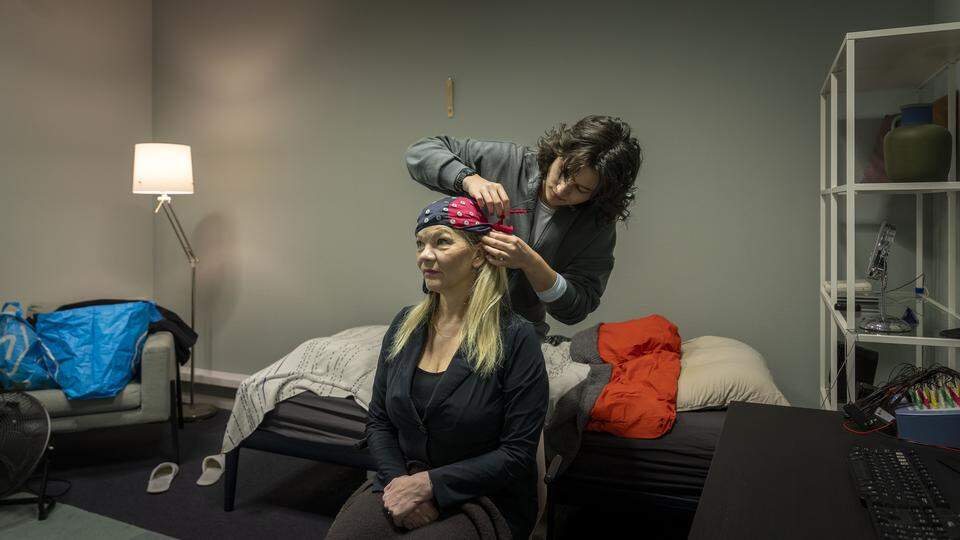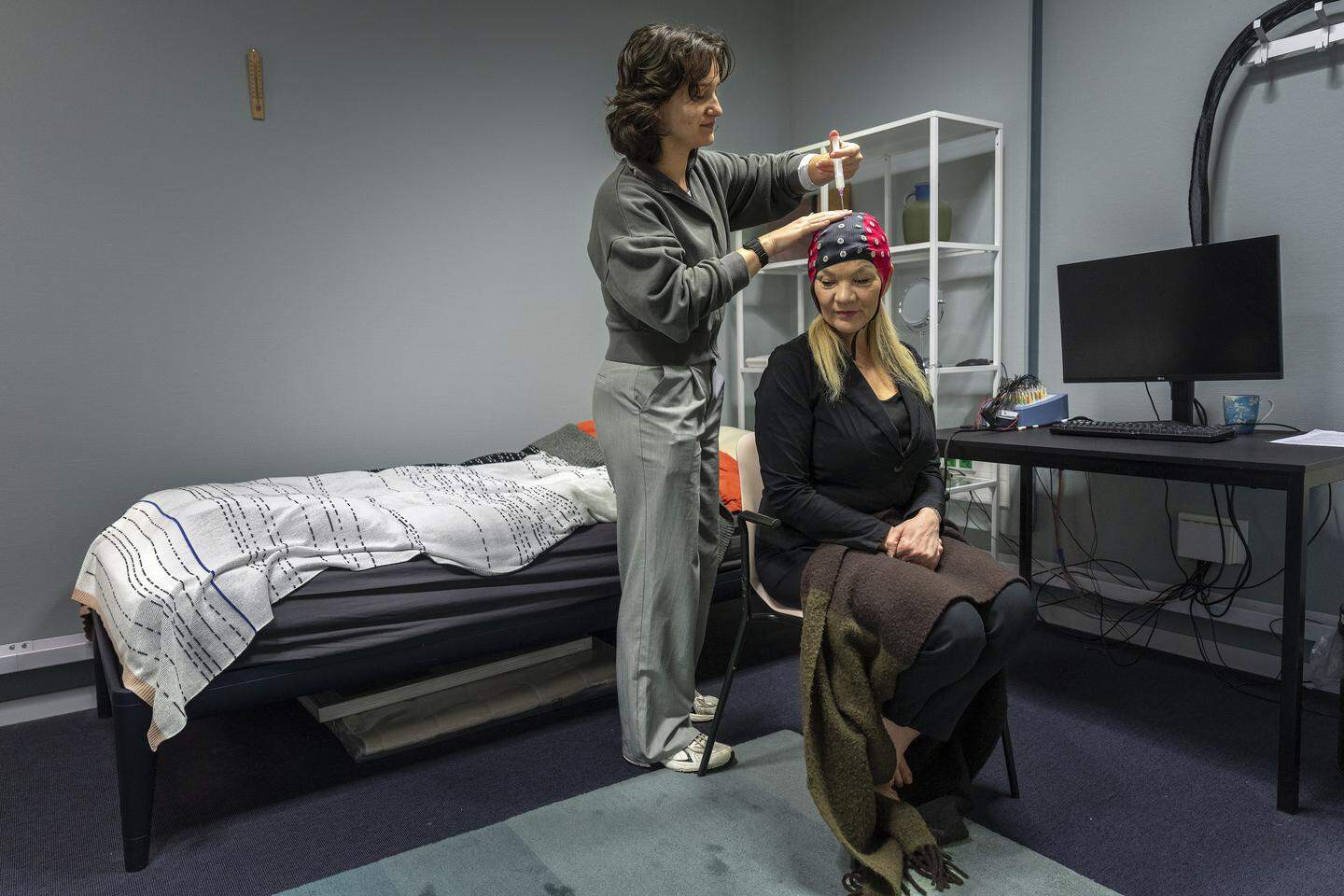Daphne hasn’t slept through the night in ten years and discovers in a sleep lab: “No wonder I wake up exhausted”

Find the original article here or keep reading for the english translation.

We worry, toss and turn, stare at the ceiling, and wake up wrecked the next morning. While sleep is crucial to our health, millions of Dutch people can’t seem to find enough deep rest. Scientists are exploring how technology can help our brains. Our sleep-deprived reporter underwent an experiment. “What’s wrong with my sleep pattern?”
On a weekday evening I lower myself into a white, clinical bed with a battery of electrodes on my head and a team of researchers watching me closely all night. It’s not exactly sexy with that odd swim-cap on, and I feel a bit watched—but it’s for science and the promise of finally getting a good night’s sleep.
By now I’m so familiar with the ceiling above my bed that I jokingly call my sleepless nights my “ceiling watch.” Deep sleep, I learn, is the holy grail of the night—the only phase in which your body truly recovers, your brain cleans itself, and your muscles relax.

Insomnia is the new pandemic, and I want to know what on earth goes wrong under my skull the moment I close my eyes. That makes me the ideal candidate for a night in a University of Amsterdam laboratory, surrounded by electrodes, little cables, and computers—to test a promising new technology designed to improve deep sleep. Welcome to the sleep lab, to the world of Deep Sleep Technologies, where sleep goes high-tech.
More than a third of the population sleeps poorly
Because I haven’t slept properly in ten years, I’m open to anything that might get me to dreamland sooner. I’m certainly not the only bad sleeper. More than a third of the population sleeps terribly, with all the consequences: reduced concentration, stress, heart problems, mental issues.
“Sleep isn’t a luxury; it’s a basic need,” emphasizes neuroscientist Dr. Lucia Talamini, founder of Deep Sleep Technologies. “If we can improve it with technology, then we should.”
Slept well or did it feel like a night in the sauna? “Your duvet shouldn’t turn into a clammy bundle.”
In the cozy little bedroom of the UvA’s Sleep & Memory Lab—somewhere between a student room and a spaceship—I’m hooked up to an EEG cap, eye and muscle sensors, and a smart headband.
This headband, Deep Sleep Technologies’ flagship, monitors brain waves and delivers a subtle sound cue at precisely the right moment. A kind of friendly “ping” for your brain; you don’t consciously hear it, but it nudges your brain waves so you sleep more deeply.
I’m a fragmented sleeper
According to researcher Talamini, this is exactly the goal. “We’re developing technology that actually deepens sleep. Not with pills, but by tracking brain activity and gently stimulating it at the right moment.”
Despite the taboo, many couples choose a ‘sleep divorce’: “Sleep is important; sex can happen at another time.”
The expert who later dissects my brain waves on a screen concludes I’m a “fragmented” sleeper—like a broken disco light: flickering and anything but restful. “Falling asleep? For you it takes an hour,” she sees on the monitor. That’s likely also because I’m in a strange environment and more on guard. But even in my own bed I don’t drift off easily and I jolt awake at odd hours.
Scrolling Instagram
What doesn’t help: chronically ignoring your natural melatonin signal by working late behind a screen, binge-watching a series, or scrolling Instagram in bed.
“Melatonin isn’t a sleep hormone; it’s a signaling hormone,” I’m told. “It tells your body it’s time for bed. If you ignore that—say by scrolling on your phone until midnight—your brain misses the signal and you can even skip entire sleep phases.”
“The idea that sleeping pills make you sleep better is an illusion—and risks like memory loss are lurking.”
My brain, the report shows, tries to make up that deep sleep at the very end of the night. As if you’re trying to buy out the entire supermarket five minutes before closing time. No wonder I wake up exhausted.
My body isn’t cooperating
There are spindles, K-complexes, delta waves, and REM blocks; I’m increasingly impressed by the night as a biological orchestra. “Sleep isn’t a passive process,” the expert says. “It’s like elite sport.”
My brain, the graphs show, is doing its best, but my body isn’t cooperating. In the lab I still step into the shower feeling refreshed in the morning; I only slept a few hours, but I feel less tired than usual. Apparently the sleep-wave stimulation had an effect. The next day I’m productive at work without the usual fog of fatigue.
Devices for home
Deep Sleep’s ultimate goal is to integrate the technology into wearables you can use at home, like sleep trackers and smart headbands. The sleep scientists are already in promising talks with various commercial parties.
They expect the first applications around 2026. “We want to give millions of people worldwide access to this technology,” Dr. Talamini explains. “So you don’t have to go to a sleep clinic, but can improve your nights right at home in your own bed.”
No crystals under the pillow
Biohacking—but scientifically grounded. No crystals under your pillow; smart tech on your head instead. Maybe in a few years we’ll all be going to bed with such a headband. Not sexy, but efficient.
Is snoring bad for me? “It’s not a harmless sound.”
Since we’re looking to the future anyway, I also had a DNA analysis done through sleep expert/author Floris Wouterson (of the book Superslapen) to look at genetic variants that indicate how sensitive I am to factors that influence sleep. Your DNA offers an indication—it says something about your predisposition, but not necessarily what actually happens. Lifestyle, diet, stress level, and habits turn out to play at least as big a role.
Sensitive to caffeine
Genes can indicate whether you’re more sensitive to caffeine, sugar, alcohol, or carbohydrates. It turns out I metabolize caffeine (and sugar) poorly. After noon I’d better stop coffee and switch to herbal tea. I’m also advised to wear blue-light-filtering glasses in the evening.
I also synthesize vitamin D slowly through my skin. The advice is to supplement and spend more time outdoors. I should quit my sleeping pills—no expert is a fan of those, I discover during this process.
The good news: you can do something about it
Thus begins my sleep training: glasses on when using screens, daily walks, and going to bed ten minutes earlier each week. It’s manageable and has a positive effect. I’m still not the ideal sleeper, for now. But fortunately there’s something I can do. With a bit of willpower, ditching the sleeping pills is possible too. Away with those half-baked dozing bouts with a head full of to-do lists—onward to sleep that truly restores and recharges.
Bad sleepers wanted
Deep Sleep Technologies, in collaboration with the University of Amsterdam, is conducting an at-home study to test their method for improving deep sleep. They’re looking for people who wake up often at night or struggle to sleep through the night. Participants use an EEG headband at home running the Deep Sleep algorithm. It plays gentle sound pulses timed to brain activity. The study lasts 12 nights. After completion and timely return of the device, participants receive €200 and personal sleep reports. If you’d like to take part, you can sign up via fordeepsleep.com.